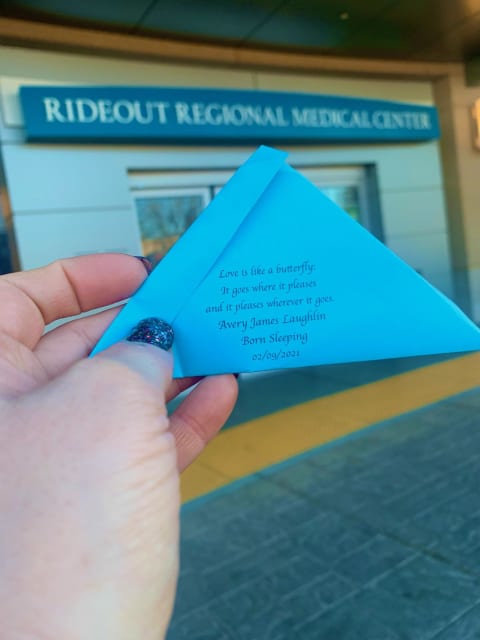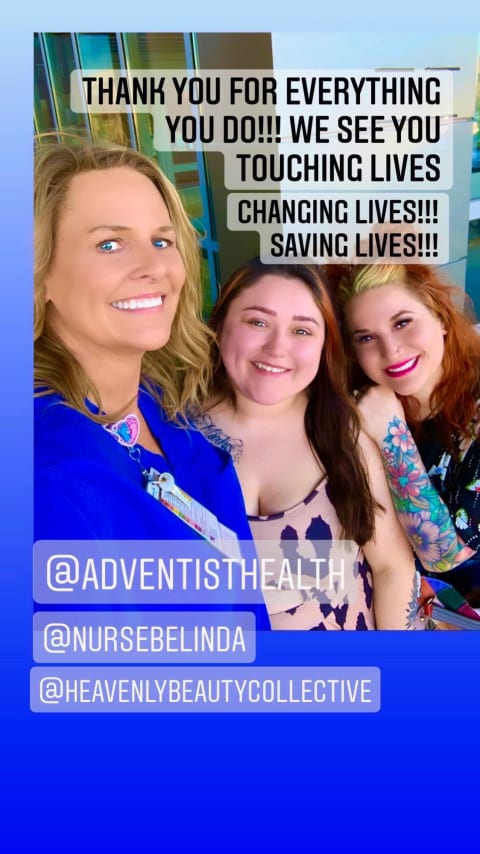
More Than Coincidence
Story 123
Some people might call what happened kismet, or a cosmic coincidence — that moment when all the cogs and gears swirling about the universe click into place. Others consider it divine intervention.
That’s what Belinda Elias thought, sobbing in a crowded salon while she embraced Heaven, a woman she was bonded to through a tragedy at Adventist Health and Rideout weeks earlier.
It was more than coincidence, Belinda says, that she happened to be at the salon that day. Just the same, it was more than a coincidence that Belinda was at work weeks earlier for what would become one of the worst days in Heaven’s life — when she came into the labor and delivery unit where Belinda worked weeks before her due date, fighting not only for her unborn son’s life, but hers, as well.
To Belinda, the events that unfolded that day and in the proceeding weeks were as though God Himself outstretched His arm and touched them all.
It was more than coincidence, Belinda says, that she happened to be at the salon that day.
Heaven came into the emergency department that morning by ambulance, about 33 weeks pregnant and bleeding. When she arrived at the labor and delivery unit, nurses couldn’t detect her baby’s heartbeat.
Within the hour, she would be taken into an operating room for an emergency C-section. There was no time for the baby’s father, Marcus, to see Heaven before she went in. She was all alone.
“We rushed her back as fast as we could,” said Becky Kugelman, a nurse who cared for Heaven. Meanwhile, Belinda — a clinical coordinator — was calling Marcus.
“We’re delivering the baby,” she told him. “We need you to get here as soon as you can.”
But Belinda and Becky had worked long enough in labor and delivery to suspect the outcome. It was unlikely the baby was alive.
“I think it was probably one of the hardest things I’ve ever done,” Belinda said, “having to call him, but not say that to him,” explaining that patient privacy laws restricted her from divulging the baby’s condition to Marcus.
In the PACU, Heaven was fading in and out of consciousness after delivery. Embracing her baby – named Avery – she woke up and looked at Becky.
“Did Avery die?”
It was a tragedy Heaven expected as a possibility but still left her inconsolably heartbroken. She sobbed as she slipped out of consciousness. When she woke, she had no recollection of what happened. Becky had to tell her again, and she experienced the death of her son all over again.
“You get into a zone where you put emotions behind you while you’re working, because you have to.”

Meanwhile, nurse Dilpreet Tanner noticed Heaven’s behavior wasn’t quite normal for post-anesthesia recovery. Her vitals were fine, but she shouldn’t have been falling asleep over and over again. Dilpreet called an anesthesiologist, Dr. James Calebrese, to let him know her concerns and asked him to be on-call.
“He came down, no questions asked,” Becky said.
Within minutes of him arriving on the unit, Heaven crashed. The heart monitors began chirping. Her vitals began fluctuating. She couldn’t breathe. They took the baby away from her and called a Code Blue.
Suddenly, the labor and delivery unit looked more like an emergency department. Nurses went through two crash carts for supplies as Dr. Calebrese intubated Heaven.
For Becky, who was an ER nurse before coming to the labor and delivery unit years ago, triage is a reflex that snaps back into place.
“You get into a zone where you put emotions behind you while you’re working, because you have to,” Becky said. “You have to do the job that’s at hand and take care of the patient in front of you.”
Belinda cleared the area, taking Marcus, Avery, and Heaven’s mother to an empty room, and called in a chaplain.
“We prayed for them,” Belinda said. “We prayed over the baby. We baptized the baby.”
A few days later, Heaven’s family called the hospital back asking if the chaplain would preside over Avery’s funeral service. He did.
“We prayed for them. We prayed over the baby."

“Born sleeping.” That’s how Heaven refers to Avery’s life.
She wrote it on notes commemorating her son’s life during a butterfly release she performed at the hospital months later, coincidentally, the same day the labor and delivery team was recognized as a department of the month. It was an opportunity for Heaven to thank those involved in her care and get some sense of closure.
It’s something that doesn’t happen that often for healthcare workers, Belinda said. More frequently, patients arrive, experience tragedy, then leave, “and that’s as much as we know,” Belinda said.
But one day in the salon changed that.
It was like any other salon appointment for Belinda, when her hair stylist, Amy, began talking about a colleague who delivered early and lost her baby. She shared how her colleague had told her about how incredible the team was, how the care the nurses and doctors delivered touched her heart, and about how one nurse — one who she hadn’t been able to find to thank — was memorably compassionate with her boyfriend, her mother, and her child. She had been searching for this nurse to thank her, Amy said.
“I just started crying,” Belinda said.
Amy stopped cutting her hair. “It’s you, isn’t it?”
She went into the back of the salon and returned with Heaven at her side.
“At that moment, there was nobody else in the room but she and I,” Belinda said.
It was no coincidence they found each other there the same way it was more than coincidence that Dilpreet thought to call an anesthesiologist; that Dr. Calebrese came to the unit minutes before Heaven crashed; and that Becky had emergency department experience and was there to triage Heaven.
“It was probably just minutes, but it seemed like an eternity we stood there holding each other, crying,” Belinda said.
For the next few minutes, Heaven and Belinda embraced, sobbing. Few words were spoken. They didn’t need to be.
Related stories

Todd Reese

Robert Ferguson

Judy Leach

Jennifer Diehl

Jen Jacobs

Restoration | Michael's Story

The Journey | Barbara’s Story

Healing Hands

Survivor | Tiffany's Story

Survivor | Chei's Story

Lighting the Way

Richard & Lula

No Longer Alone

A Race to Survival

Angels at Work

One in a Thousand | Fadi's Story

Medicine and Miracles

Meredith Jobe

Lisa Clark Diller
